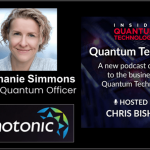A Deeper Look at the 2023 DiviQ Summit

The field of quantum technology is advancing at an unprecedented pace, holding the potential to revolutionize industries ranging from computing and cryptography to healthcare and logistics. As the quantum ecosystem continues to grow, it becomes imperative to ensure that diversity and inclusivity are at the forefront. Leading the charge is the non-profit organization DiviQ (Diversity in Quantum), led by Denise Ruffner, Mike Dascal, and Cindy Wood Bacon. “There’s a general agreement across the ecosystem that we should be focusing on diversity, and we should be doing it from the start,” explained Dascal. This year, DiviQ is holding its first “Diversity in Quantum” Summit, hoping to unite underrepresented groups and individuals to network and learn from each other. The theme for this year’s Summit is focused on overcoming failure.
The Need for Diversity in the Quantum Ecosystem
Because the quantum ecosystem is built on the fields of quantum physics, mathematics, engineering, and computing, all of which tend to be heavily dominated by one type of demographic, the ecosystem itself is in jeopardy of reflecting this same bias. A quantum ecosystem encompassing individuals from diverse backgrounds, experiences, and perspectives is better equipped to tackle complex problems and develop creative solutions. Research has consistently shown that diverse teams produce better outcomes, and this principle applies to quantum technology development as much as any other field. Encouraging representation of women, minority groups, and other underrepresented individuals in quantum research and industry can lead to a broader range of ideas, methodologies, and applications.
Ruffner has seen this to be the case in her own career, as she has led the Women in Quantum organization, a sub-group of OneQuantum, for many years. “It’s worth noting that Denise’s work on Women in Quantum has really paved the way,” stated Dascal. “So many people know us [DiviQ] in the sense that they know Denise. So, when they hear about this initiative, they are thrilled to get involved.” Ruffner’s own passion focused on helping others, as she explained that “it was important to me that I worked for an organization that was nonprofit.” However, she realized that more underrepresented groups, beyond women, needed support in the quantum ecosystem. This was when she contacted both Mike Dascal and Cindy Wood Bacon. For Dascal, this was a perfect opportunity to give back to a community near to his heart: the LGBTQIA+ community. “Specifically, I wanted to model a ‘Queers in Quantum’ group, after women in quantum, and hopefully work together on that,” Dascal added. Wood Bacon was added somewhat later, contributing a management consulting experience. “This is especially helpful as we continue to build partnerships within the quantum industry – we will be able to offer employers access to a number of previously untapped talent pools,” Wood Bacon said.
From the collaboration between Ruffner, Dascal, and Wood Bacon, DiviQ was born. As a non-profit, it offers various resources for underrepresented communities, from affinity groups to job postings. DiviQ is even working on releasing a mentorship program for anyone within these underrepresented groups. “One thing is worth mentioning is that we don’t represent every underrepresented group,” Dascal said. “And we really want to make sure that we’re not speaking for groups we aren’t a part of. So, one of the goals of having these kinds of voices. We want there to be a BIPOC in the quantum group, we want there to be a group for neurodivergent people. I want things like that to be decided by members of that community. This means it’s important to us that people step up and say, ‘I want to get involved.’” For Wood Bacon, DiviQ also offers something to the growing companies within the quantum ecosystem: “At DiviQ, we want to work with companies to allow them to showcase their capabilities and provide a pipeline for talent to help address this shortage,” Wood Bacon elaborated, speaking on the diversity shortage within the industry. “We also aim to work with universities worldwide and other educational outreach programs to create awareness for and excitement around the quantum industry. “
While the organization is young, its public response has been resoundingly positive. “Most of these stakeholders recognize the need for an organization like this to make representation happen a little bit more proactively than they can do on their own,” Dascal said. The DiviQ leaders hope to harness this positive response to progress forward. “What’s different about this is we already have a group of startups that want to support this,” added Ruffner. “So they’re just starting to come in, and we are going to have a board of directors, which is going to be from the founding startups, and it’s going to be a diverse board of directors.”
The First DiviQ Summit
Despite its young age, or perhaps because of it, DiviQ’s first “Diversity in Quantum” Summit is almost underway (as it begins August 12) and has a large number of registrants. As Ruffner elaborated: “We’re excited about it because people are signing up. And then we’re also excited about the diverse group of speakers.” The speakers for this year’s Summitt include Shahar Keinan (CEO and CoFounder of Polarisqb), Martin Mevissen (Senior Manager of AI & Quantum at IBM), Tzula Propp (Postdoctoral Researcher), and Pedro Lopes (Quantum Advocate, QuEra Computing Inc.).
As this year’s Summit focuses on overcoming failure, the DiviQ team hopes the audience walks away with an inspiring message. “Adversity is part of the human experience, and the summit theme of failure is relatable to most,” stated Wood Bacon. “We hope that attendees will come away energized to continue their quantum journey, equipped with a few techniques to foster resilience, and perhaps build a stronger network.”
Besides various talks, the Summit will also host a networking session, which Dascal, in particular, believes is essential for underrepresented communities. “I think that, when you are the only queer person in your physics cohort, it’s good to have those connections,” he said. “It’s important to make those connections. Because without that, that’s where you don’t get that feeling of belonging.” As it can already feel isolating for women and other underrepresented groups within the quantum ecosystem, networking events focused on these individuals can help people feel more supported and welcomed into this space, which in turn can help make the quantum ecosystem more diverse.
Beyond their first Summit, the DiviQ team plans other projects to help the underrepresented groups within the quantum community. As Dascal explained: “We’re hoping to be able to fund people in the space who need funds to do things like travel to conferences and present their work. It’s important to us that we’re able to help out not just through networking and stuff, but actually financially where it matters.”
Kenna Hughes-Castleberry is a staff writer at Inside Quantum Technology and the Science Communicator at JILA (a partnership between the University of Colorado Boulder and NIST). Her writing beats include deep tech, quantum computing, and AI. Her work has been featured in Scientific American, New Scientist, Discover Magazine, Ars Technica, and more.



















